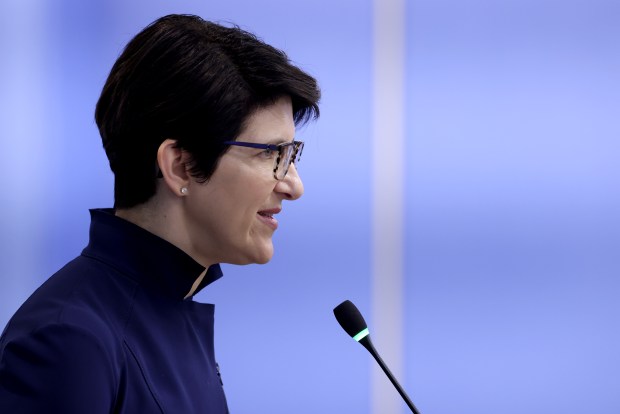Mayor Brandon Johnson’s administration stressed his attempts to increase property taxes in his 2025 budget in a presentation to city investors this week, his team told reporters Friday.
On Thursday, the first day of an annual conference hosted by the mayor’s office, potential buyers of city debt heard from Johnson and his budget team about Chicago’s financial state and its borrowing and spending plans — though this year the mayor broke with tradition and barred reporters from attending. But Chief Financial Officer Jill Jaworski briefed reporters Friday on what she said transpired in the closed-door gatherings the previous day.
Though Jaworski said the investors were not focused on the upcoming 2026 budget, her presentation to them did note “The Administration vigorously attempted to increase property taxes as part of the FY 2025 budget and thereby achieve greater recurring revenues,” according to a copy provided by Johnson’s team.
Asked about the property tax line, Jaworski said it was “important to stress” to potential investors that “We have approached both the existing budget challenges as well as the goals for investment in key areas as things that need to be dealt with from a place of fiscal responsibility.”
Johnson came out the gate with a whopping $300 million property tax hike proposal during his 2025 budget process despite his campaign promise to hold the line on that levy, only to see it whittled down to zero by aldermanic resistance across the political spectrum. In its place, he proposed a flurry of new fine and fee hikes, like increases to cloud computing and digital subscription taxes and additional speed cameras, that got him across the finish line.
Jaworski said for next year, the administration wants to discuss more sustainable revenue streams and will join the City Council’s subcommittee on revenue in June to discuss “the most feasible and appropriate” ideas. She said investors on Thursday concurred with the “need to achieve better equity in our taxing system.”
Jaworski didn’t get specific on new revenue besides advocating for Springfield to amend Chicago’s sales tax to broaden the services for which it applies. She did, however, take a jab at aldermen and contended they made the situation going into the 2026 budget worse by not making the hard decision to hike property taxes this year.
“I think it’s a challenge,” Jaworski said when asked if the mayor has enough political capital to muscle through a property tax increase this time around. “City Council made it more challenging for themselves by not passing more revenues last year or pushing too heavily, I should say, to rely on one time solutions.”
Johnson has repeatedly pledged more transparency and an earlier timeline for this year’s budget process. To back up the promise, he announced last month a budget working group pulling in leaders from across the city.
Several aldermen, including some progressive allies and other moderates who called for more input opportunities, declined invitations to join the group. Johnson’s administration finally announced the 25-member team Friday.
The working group will be chaired by Loop Capital CEO Jim Reynolds and Chicago Urban League CEO Karen Freeman-Wilson. They will be joined by an array of union leaders, business executives, civic group leaders, urban planners and five aldermen: Pat Dowell, Jason Ervin, Will Hall, David Moore and Michael Rodriguez.
The group will be advised by Ernst & Young, Johnson’s statement said.
Also invited but ultimately opting out of joining the group were Alds. Ruth Cruz, Jessie Fuentes, Timmy Knudsen and Matt O’Shea, signaling larger problems with the mayor’s relationship with council members, both progressive and moderate.
Knudsen had told the Tribune his acceptance would be contingent on the administration supporting his bid to amend the controversial $830 million infrastructure bond the City Council passed in February and change the repayment structure to add small early payments.
Jaworski said Friday the Johnson administration plans to continue to let many of the city’s tax increment financing districts expire without renewal. The ongoing shift will push more money into the budgets of different local governments and help Chicago pay for the $1.25 billion bond plan Johnson passed last year.
“There will be some extensions, but we want those to be a modest number,” she said.
She said it is too early to determine how large a TIF surplus Chicago will declare, but added many aldermen were skeptical of last year’s record-breaking TIF surplus giving a windfall to Chicago Public Schools only for CPS to not make an expected pension payment to the city. The fate of that disputed pension, the Municipal Employees’ Annuity and Benefit Fund, has still not been resolved, Jaworski said.
The current market uncertainty has done little to change the city’s borrowing plans, she said. But the city’s top financial planners continue to anxiously watch President Donald Trump’s moves and have a “great deal of concern” about federal funding cuts, Jaworski said.
“We do not have the capacity and will not be able to step into the shoes of the federal government if they do not continue the grant programs that they currently have,” she said. “But our residents will be affected.”
Johnson faced a brutal budget fight last fall before finally agreeing to a budget with the council in mid-December. The budget they crafted has seen tweaks throughout the year, including when Johnson announced Tuesday the city will spend $7 million to supplement the salaries of early childhood care workers.
The influx of cash will increase wages for over 3,000 workers, bringing their pay closer to that of school teachers, his administration said.
The move was praised by Service Employees International Union Healthcare Illinois, which represents many of the affected workers. A coalition of local SEIU locals played a critical role in getting Johnson elected, but a dispute between SEIU and the Chicago Teachers Union is threatening to break up the organized labor unity that propelled Johnson to victory.





